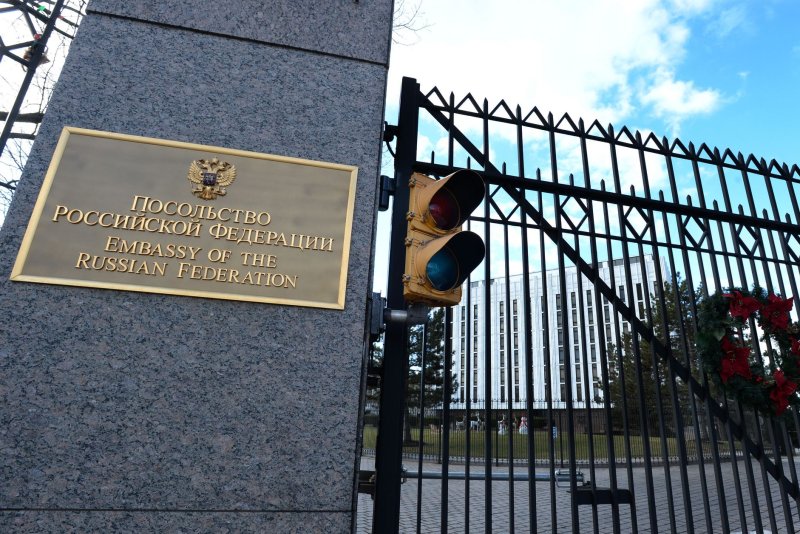The Russian Embassy is shown in Washington, D.C., on December 30 after former President Barack Obama imposed sanctions and expelled 35 Russian diplomats from the country. A group of bipartisan senators introduced a bill Wednesday that seeks to give Congress veto power if President Donald Trump's administration attempts to lift or ease sanctions on Moscow. File Photo by Pat Benic/UPI |
License Photo
Feb. 8 (UPI) -- A bipartisan group of senators introduced legislation Wednesday to allow Congress the power to reject sanctions relief for Russia if ordered by President Donald Trump's administration.
The senators introduced The Russia Sanctions Review Act of 2017, which mandates congressional approval of any easing of sanctions on Moscow imposed for its activity in Ukraine -- such as those levied against President Vladimir Putin's government in 2014 when Russia annexed Crimea.
Trump has repeatedly said that he believes he can improve U.S.-Russia relations, which may or may not include easing some economic sanctions against the Kremlin. The senators' bill seeks to make sure Congress has veto power in case the president does go that route.
"Vladimir Putin is a thug bent on tearing down democracy -- and Russia's meddling in U.S. institutions is a threat to our national security," Sen. Claire McCaskill, D-Mo., said in a statement Wednesday. "Any decision to roll over on sanctions needs to meet a high bar in Congress."
Under the proposed law, Trump's administration must outline to Congress what sanctions it wants to ease, certify that Russia has stopped trying to "undermine" peace in Ukraine -- and ceased committing cyberattacks against the United States.
The Senate and House would then have 120 days to act -- or decline action -- on any proposed sanctions relief. After that period, if both the Senate and House haven't voted to support "a Joint Resolution of Disapproval," the sanctions would be granted.
"Russia has done nothing to be rewarded with sanctions relief," Sen. Lindsey Graham, R-S.C., said in a statement. "To provide relief at this time would send the wrong signal to Russia and our allies who face Russian oppression. Sanctions relief must be earned, not given."
One gauge for determining whether Moscow gets relief from sanctions, the senators say, is the Minsk Protocol -- a cease-fire agreement struck between Russian and Ukrainian leaders six months after Crimea's annexation.
"If the U.S. were to provide sanctions relief to Russia without verifiable progress on the Minsk Agreements, we would lose all credibility in the eyes of our allies in Europe and around the world," Sen. Ben Cardin, D-Md., added. "We have a responsibility to exercise stringent oversight over any policy move that could ease Russia sanctions."
In addition to McCaskill, Graham and Cardin, the legislation is supported by Sens. Marco Rubio, R-Fla., Sherrod Brown, D-Ohio, and John McCain, R-Az.
"The United States should not ease sanctions on Russia until Putin abandons his illegal annexation of Crimea ... and permanently ends Russian aggression in Ukraine, and fully implements the Minsk accords," Rubio said.
"Lifting sanctions now would only reward Russia's attempts to undermine democracy," Brown added.
McCain, a staunch supporter of the Russian sanctions and chairman of the Senate Armed Services Committee, said granting Moscow sanctions relief is not warranted in any regard.
"[It] would send the wrong message as Vladimir Putin continues to oppress his citizens, murder his political opponents, invade his neighbors, threaten America's allies, and attempt to undermine our elections," he said. "Congress must have oversight of any decision that would impact our ability to hold Russia accountable for its flagrant violation of international law and attack our institutions."
Before it can become law, the bill must have enough support in Congress to override a certain presidential veto from Trump. Wednesday, the president tweeted, "I don't know Putin, have no deals in Russia."















